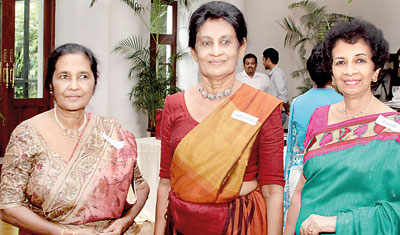Pera ’63 batch rejoice and reminisce | Celebration of a Golden Jubilee
It was a noisy Golden Jubilee celebration with hearty greetings flying around as the ’63 batch of the then University of Ceylon, Peradeniya celebrated their university days with fellow batch mates and Peradeniya contemporaries. Several of their teachers were a part of the celebration luncheon at the Mount Lavinia Hotel, some making a special trip from Kandy for the event.

Rajitha, Indramala and Manel. Pix by Indika Handuwala
While the noise regretfully prevented Professor Savithri Goonesekere from addressing the gathering, raising his voice above the din, Guest Speaker Professor W.D. Lakshman attempted to enlighten this one-time privileged generation of students who had held high positions as diplomats, lawyers, administrators, academics and in medical, scientific and numerous other fields, on the plight of the present University student-population and the higher educational system that was in jeopardy.
A foremost economist and former Vice Chancellor of the Colombo University Professor Lakshman’s solution was that the authorities in the finance sector should work out ways of giving greater priority to higher education.
Ills consequent to the expansion of admissions to the University of Ceylon he said, commenced in 1960 when the gradual change to swabhasha in the secondary schools, doubled the admissions to the Arts Faculty. The numbers kept swelling and Prof. Lakshman stated that except for Jaffna, Moratuwa and Ruhuna Universities which were exceptional for different reasons, Universities such as Sabaragamuwa, Rajarata, the Eastern, the Southeastern, Uva-Wellassa, Wayamaba etc. set up to meet the increasing demand for higher education, lacked even minimum physical infrastructure facilities.
Another vital lapse the Professor said was that while the numbers of University aspirants kept expanding, the percentage or the ratio of those receiving tertiary education in the relevant age group, remained low.
In Sri Lanka, in spite of the free education system and state support for education, we have failed to raise the tertiary enrolment ratio even by 10 percent. Deterioration of methods adopted in the expansion of Universities and the quality of education imparted by most departments and faculties in state universities, particularly in disciplines such as Arts, Social Sciences and Commerce have further impacted on the University system.
Policies and strategies from a number of dimensions therefore were needed to combat these impediments, he said, calling for the administrative authorities in the Education Ministries, the UGC and the Universities along with the academics to work towards such a goal in a spirit of cooperation rather than confrontation.
Follow @timesonlinelk
comments powered by Disqus


